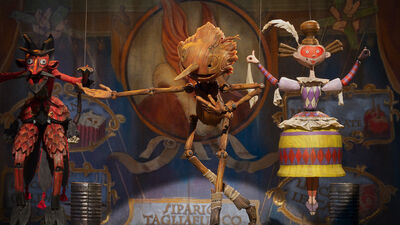“In this world, you get what you give,” the fantastical do-gooder tells Sebastian, tasking him with Pinocchio’s moral guidance in exchange for a wish. The cricket replies, “I try my best, and that’s the best anyone can do.” Del Toro and McHale feature multiple pithy refrains like these, which avoid repeating fairytale platitudes based on impossible rectitude. Instead, they advocate for the wisdom found in forgiving oneself for the mistakes of the past because it’s in between failures and triumphs that our lives are written. Precisely how the illusion of stop-motion animation occurs in between the frames that remind us of what we are witnessing is painstakingly executed cinematic puppetry.
Unlike the face replacement technology that some studios such as Laika employ to achieve nuance in the performances of the stop-motion puppets, del Toro and co-director Mark Gustafson, who honed his skills with Claymation master Will Vinton, utilized figures with mechanical visages that require delicate manipulation from the animators for a slightly less immaculate result in movement, but one that makes the hand of the artists known.
One can’t help but marvel at the superb craftsmanship in every detail of the characters that inhabit this darkly whimsical realm. Every hair strand on Geppetto’s head, the wrinkles in his weathered artisan hands, or the material of his garments are individual, minuscule strokes of genius. The design of Pinocchio himself feels elemental, with the organic blemishes of real wood, without clothing, and sporting a mischievously adorable face and an explosive hairstyle. This might be the most truthful on-screen depiction of the character ever. In the breathtaking dedication of those in charge of the production design, the costumes, and the constructions of the sets, large and miniature, the film finds its soul.
Yet as innocent as Pinocchio is—early on, he sings about every object he encounters as an incredible discovery—there’s an abrasive side to his personality that resonates honestly with the less flattering aspects of children’s behavior. Not only is Geppetto not immediately accepting of his new offspring, given that the Catholic churchgoers believe it to be sorcery, but he hopes to mold him into who Carlo was.
But Pinocchio, born without the inhabitations of the human condition, only conforms to the norms to gain his father’s validation. Del Toro is nothing if not a gentle champion of the misunderstood to those whose appearance, origin, or worldview isolate them from the homogeneity of the masses. And in this wooden boy, he finds a walking and talking symbol for the indomitable power of nature, of chance, of the unpredictable factors that can enrich our days even if they weren’t precisely what we had hoped for.
Sumber: www.rogerebert.com
 Skip to content
Skip to content






